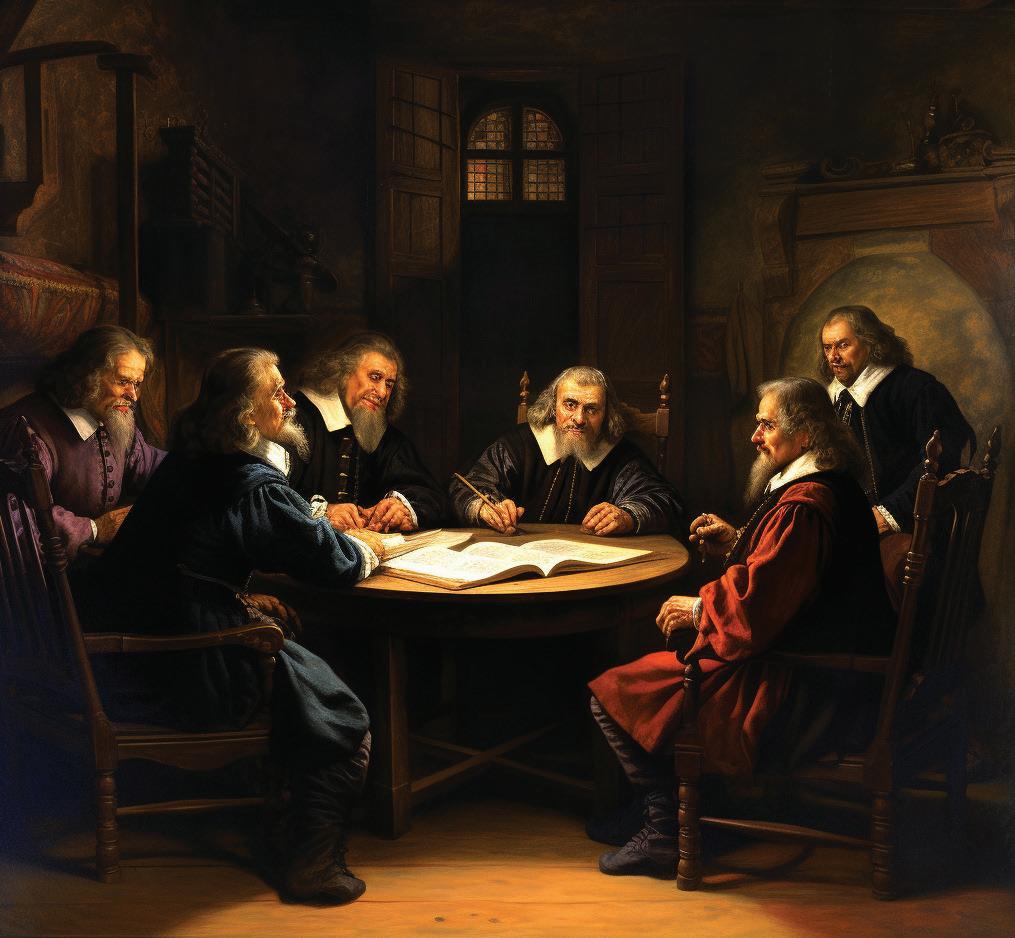
8 minute read
University Challenge: the gentlemanly gaze.
University Challenge: the gentlemanly gaze.

All lawyers learn about the 17th century coffee shops in London where ‘enlightenment thinking’ influenced the development of law as much as any other sector of society. The coffee shop conversations were exclusively for gentleman. The coffee shops were periodically subject to forced closures due to the topics being promoted which directly challenged the status quo, for example, arguments for religious toleration during a time of violent schisms.
As a result, gentlemen scholars moved to clandestine locations in exile to hold conversation circles where they sought to replace notions of Aristotelian certainty with probability and reasonableness, values that became the foundation to the UK common law system. The conversational circles had rules, handwritten in Latin by the English philosopher and political theorist, John Locke; to practise a Ciceronian ethic of civilita towards each speaker; to take turns in the conversation; to be constructively critical; to be self-aware; and not to rebuke unless absolutely necessary, but to impose silence upon any member of the circle who fell victim to his own ‘enthusiasms’.
What emerged from these conversation circles was a code of gentlemanly conduct, reflected for centuries in the City’s term ‘My word is my bond’. The values nurtured and respected were ‘truthfulness’ and ‘honour’ which have deeply impacted on how the law today evaluates evidence in court.
The original ambition of these men of letters was a ‘Commonwealth of Learning’; a progressive endeavour for the time. However, many historians of law have charted the patriarchal and colonial legacy of the ‘gentlemanly gaze’ which pervades legal knowledge and practice today. The challenge for feminist academics of law in University therefore, is to address this legacy, mindful that the intention was ‘to pull down rather than build up’ a stifling tradition of Aristotelian thought.
So I asked Dr Sarah Corbett, Associate Professor at The University of Law and Criminal Defence Barrister to discuss her approach; she is well placed not least because her doctoral research explores how criminal law and evidence construct gendered and racialised legal subjects. In a short extract from a longer conversation, I ask her to talk about the ways in which her teaching seeks to challenge the ‘gentlemanly gaze’ of the enlightenment legacy.
MB: Does the Equality Act 2010 deal with the legacy of the development of our law, in particular, does it adequately cover aspects of intersectionality?
Sarah: I think the intersectionality aspect highlights the complex way in which things get played out. So you know, for Black women it’s not just the fact they experience sexism, but that they experience it in a different way to white women and experience racism in a different way to black men. I think that the key point about intersectionality is the way that it plays out in the context of colonialism and racial capitalism, particularly neoliberalism. The vast majority of cases take place in the lower courts, whereas students tend to consider Supreme Court. These higher court decisions don’t necessarily reflect what is happening on the ground for the marginalised communities, such as their experiences of racialised stop and search.
MB: So are you saying the idea of intersectionality has not trickled down into practice?
Sarah: I think the law is making changes, but it can be quite surface change that does not necessarily get to the heart of the matter.
MB: How do you draw on your own professional experience as a Criminal Defence teaching prospective lawyers, to address this complexity?
Sarah: I might ask them to consider how the law has a tendency to divide women into binary categories of either victim or offender. I have observed this dynamic as a criminal defence lawyer, where women I have represented may be victims of male violence; sometimes they’ve been coerced into committing offences or fought back against a violent partner, or got pressured into prostitution and had to deal with violent partners who are also their pimps. Many of the women may also have a problem with class A drugs, or come from marginalised areas of society, have grown up in care, or have experienced sexual abuse often as a child but also as an adult and because of this, they’re in situations very dangerous to their physical and mental health. Then their life choices can be extremely limited. So I point out that there’s often an overlap between suffering harm and getting into trouble themselves. So I try to encourage discussion of how and why the criminal justice system seeks to draw these false binary divides between women as offenders and women as victims.
MB: And in terms of men?
Sarah: Similarly, if you are framing individual men as a danger, I think we have to look at how we conceptualise sexual harm and rape. This goes right back to slavery and colonialism. There is some really interesting work by Ida B. Wells and Angela Davis that discusses the links between the discourses that falsely portray black men as rapists and those that serve to render invisible the sexual assaults suffered by black women. This narrative was deployed as a means of protecting white supremacy in the post-slavery period in the US.
It is a narrative that has not gone away in the post slavery period, and continues to permeate cases today. Recently, child sexual grooming cases have been portrayed in terms of black perpetrator/ white victim - in ways that don’t accord with the facts, which were - that all of the defendants in one West Midlands case1 are white. This though didn’t seem to change the government narrative with Suella Braverman talking about there being a problem with Pakistani men. Nor did it change some media narratives that joined in portraying sexual deviance in racialised terms. So, I raise awareness around how we conceptualise sexual harm and rape.
MB: What can the University do to challenge this kind of negative representation?
Sarah: Well, in relation to criminal law we can encourage students to recognise the partiality of the law, so we would focus on approaches to giving evidence by looking at mechanisms for excluding evidence - to see whether what has been obtained has been done so fairly and we would emphasise that these exclusionary provisions, don’t necessarily get to the crux of the matter. It’s important not to inadvertently legitimise unfair legal practice and recognise there is a lot of unfair evidence practice, as students from marginalised backgrounds see how such mechanisms work on the ground. Excluding prejudicial evidence is helpful but it doesn’t address the underlying unfairness in the legal system.
MB: And how do the students respond to this kind of critical discussion?
Sarah: Students are interested in these contemporary issues. One came up to me yesterday wanting to write a dissertation on the criminalisation of Rap, Drill and Grime music in response to the Criminal Behaviour Orders that have been banning young people from making or performing certain types of music. So there is debate in the University, and some areas of the media, that however, does not get filtered out to the courts; things like ‘gangs narratives’ are still used frequently by prosecutors in ways that affect character evidence. There is a lot of scope for debate in the university about these subjects, and in academia people are bringing up these issues, like the racialised use of the gang narrative, drill music and character evidence. But in courts, discourses such as the gang narrative are still used very frequently by prosecutors. So I think that it’s about marking students aware of those sorts of issues, and also giving students the opportunity to share their experiences, and giving them space to express that.
Molly: And in terms of your own role, representing issues of racialised and gendered narratives that circulate in the criminal justice system - how do you manage that power differential?
Sarah: I think when I mention these issues as a white middleclass woman, students feel more confident to discuss their own issues. They shouldn’t need my validation…. but I think we have to recognise the power dynamic in a student-teacher relationship. The key point is about empowering students by encouraging them to relate their lived experiences to these debates and giving them the theoretical tools to analyse these issues.
This excerpt, from a much longer conversation with Sarah, frames the ways in which as an educator she manages the legacy of our common law system. She works with students to enable them to identify the mechanisms that codify legal customs and norms for conduct, and helps them analyse the court documents, witness statements, the victim’s complaint, and the accused’s defence - which frequently reproduce gendered and racialised subject positions.
What Sarah shares with her counterparts from the 17th century is a scholarly commitment to values of criticality and reflexivity. She also shares their desire to challenge a tradition of legal theory and practice that no longer reflects the needs of its times. Her approach is emblematic of how universities are challenging the body of legal knowledge shaped by our gentlemanly philosophes, to make it fit for purpose in the 21st century. ■

Dr. Sarah Corbett
Dr Molly Bellamy was talking to Dr Sarah Corbett.
Operation Satchel 2022-2023 (information commission office reference number: IC-260356-D0H7) https://ico.org.uk/media/action-weve-taken/ decision-notices/2023/4027435/ic-260356-d0h7.pdf










